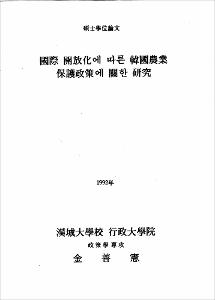國際 開放化에 따른 韓國農業 保護政策에 關한 硏究
= (A) study on Korean agriltural protection policies of open-door market
- Files in This Item:
-
-
Download
 000000066320.pdf
기타 데이터 / 2.96 MB / Adobe PDF
000000066320.pdf
기타 데이터 / 2.96 MB / Adobe PDF
-
Items in Repository are protected by copyright, with all rights reserved, unless otherwise indicated.